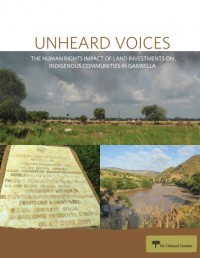New satellite imagery shows extensive clearance of land used by indigenous groups to make way for state-run sugar plantations in Ethiopia’s Lower Omo Valley, Human Rights Watch and International Rivers said today.
The World Bank’s Board of Executive Directors has approved a full investigation into whether the Bank has breached its policies in Ethiopia and contributed to a government program of forced population transfers known as ‘villagization.’
IDI has assisted Anuak indigenous people from Ethiopia’s Gambella region to submit a complaint to the World Bank Inspection Panel implicating the Bank in grave human rights abuses perpetrated by the Ethiopian Government.
Published in Wednesday April 24th, 2013
Millions of acres of Ethiopia’s most fertile land are being made available to investors, often in long-term leases and at giveaway prices. Although proponents of these investments call them “win-win” deals, the reality proves much different. This briefing paper provides an overview of the human rights impacts of land investment and the villagization process on the indigenous Anuak community in Ethiopia’s Gambella region. The struggle of the Anuak in Gambella is emblematic of the struggles of other communities in Ethiopia that are being forcibly displaced to make way for largescale land investors.
Ethiopia remains one of the world’s poorest nations, with its government attempting to attract large-scale foreign investment in a bid to alleviate poverty and create jobs to millions of citizens. Investors from India, China, Saudi Arabia and Turkey are currently eyeing large tracts of land to cultivate cereals, coffee, tea and rice, among others. According to human right organisations, Ethiopia has leased over 600,000 hectares of land to Indian companies alone.
A leaked World Bank report calls for an investigation into allegations that a multi-billion dollar aid program in Ethiopia is underwriting the forced relocation of hundreds of thousands of ethnic minorities to free up fertile land to lease to investors.
Published in Monday March 18th, 2013
In Opinion
In 2010, the Ethiopian government began moving thousands of people out of the rural villages where they had lived for centuries to other areas several hours’ walk away. The Ethiopian government calls this program the “Commune Center Development Plan and Livelihood Strategy” and claims it is designed to bring scattered rural populations closer to schools, health clinics, roads, and other public services. But the Commune Center program has been marked by a string of human rights abuses linked to government attempts to clear huge tracts of land for foreign investors. According to testimony collected by Human Rights Watch and other groups over the past two years, the relocations have involved beatings, imprisonment, torture, rape, and even murder. In many of the new “villages” the program has created, the promised services do not exist. Deprived of the farms, rivers, and forests that once provided their livelihoods, many people fear starvation, and thousands have fled to refugee camps in Kenya and South Sudan.
The UN Human Rights Council has already made available for viewing the report with all communications sent by the Special Rapporteurs, as well as the answers received by the Member States.
Published in Saturday January 24th, 2009
In Reports
This report has the summary of communications sent and replies received from following Governments: Argentina, Bangladesh, Brazil, Cambodia, Cameroun, China (People’s Republic of), Colombia, Ethiopia, Greece, India, Iraq, Israel, Japan, Kyrgyzstan, México, Nigeria, Panamá, Russian Federation, Sri Lanka Sudan, Suisse, Turkey, United States of America, Uzbekistan, Zimbabwe. In the context of his mandate, the Special […]
Published in Friday January 26th, 2007
In Reports
This report has the summary of communications sent and replies received from following Governments: Angola, Australia, Bangladesh, Cambodia, China, Ecuador, Ethiopia, Guatemala, Guinea Equatorial, India, Indonesia, Israel, Mexico, Nigeria, Pakistan, Philippines, Russian Federation, The Sudan, Turkey, Zimbabwe, and other actors like United Nations Interim Administration Mission in Kosovo. In the context of his mandate, the […]

